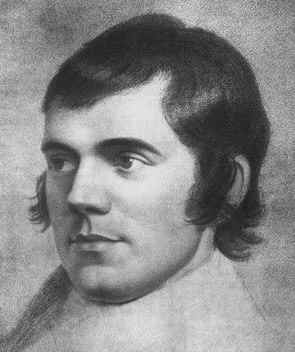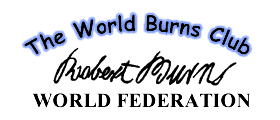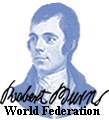|
There is something magical about the song "Auld Lang Syne" for
me. There always has been, perhaps because it is associated with a magical
holiday, New Year's Eve, or Hogmanay, if you prefer, when, for a few moments,
the World is united in a spirit of peace and brotherhood, along with an
overwhelming sense of optimism for the coming year -- and "Auld Lang
Syne" is so appropriate for the occasion. It's message is one of
optimism for the future, whilst remembering where we came from -- the
words to this song had to have come from a special man -- Robert Burns.
Why does Robert Burns appeal to his many followers the world over, many
of whom are not from Scotland or have never set foot there? The appeal
of Burns, in my humble opinion, is the very spirit of "Oor Rabbie",
a universal spirit that knows no nationality: one that lives life to the
fullest, committed to the ideals of friendship, brotherhood, and freedom
of the spirit from religious and political tyranny. Burns could truly
be called a "citizen of the world", a geo-political and cultural
distinction that a lucky few are awarded. Burns is a citizen of every
country where Scots and their descendants reside.
Consider my own country, the United States of America. Our Republic was
founded on the ideals of the Enlightment, ideals that Burns actively supported
in many of his works. We find Burns in our Declaration of Independence
(based, we are told, on an older version, the Declaration of Arbroath,
in 1320) -- the ideals that all men are created equal, and that all are
entitled to "life, liberty and the pursuit of happiness" --
one could surely argue that "A Man's a Man for a' That" is just
another version of Jefferson's great document signed in the City of  Brotherly
Love that fateful July day, and that "Scots Wha Hae" could refer
to Washingtonat Yorktown as well as the Bruce at Bannockburn. Look at
the record through recent history; when democratic ideals were threatened,
Scots and Americans stood side-by-side in a common commitment to ideals
that both our countries cherish to this day. Brotherly
Love that fateful July day, and that "Scots Wha Hae" could refer
to Washingtonat Yorktown as well as the Bruce at Bannockburn. Look at
the record through recent history; when democratic ideals were threatened,
Scots and Americans stood side-by-side in a common commitment to ideals
that both our countries cherish to this day.
For myself, as an American, Burns is the embodiment of all the contributions
made to my country in its infancy by the Scottish people; his fight against
the religious hypocrisy found in the Church of Scotland may also be seen
in the American commitment to freedom of religion, and his political fight
against secular tyranny seen in our commitment to Democratic government
and the equality of all citizens.
Besides such lofty ideals, Burns can be seen in our earliest settlers
in their leisure as well. There is no doubt that He enjoyed the odd "wee
dram" now and again, dancing, singing and the social company of the
local beauties -- for our founding fathers and for the settlers who pushed
westward in search of something better, life was not the most pleasant
thing, and you took what pleasure you could, because the majority of your
time was spent at work -- no wonder that Scotland has had a profound effect
on America's speech patterns, her traditional music and dance, as well
as the time-honoured tradition in the Southern US of "moonshine",
the "water of life". Unfortunately, since these settlers lived
most of their lives on a ever-moving frontier, their ethnicity soon disappeared,
and today, Scots and their Ulster-Scottish cousins are the "forgotten
ethnic-group" in this melting pot of ours, although the continued
efforts of Saint Andrew's and Caledonian Societies, the numerous Scottish
Clan associations and Highland Games in all 50 states, not to mention
our newest holiday, Tartan Day, still keep alive the spirit of "auld
Scotia" in the New World.
 Finally,
there is something magical in the fact that every 25th of January, or
thereabouts, those of uswith Scottish heritage, long separated from the
homeland, can gather for a few hours, and be united, not in physical presence,
but in spirit, with the hundreds of thousands across the world who share
our common heritage by celebrating one of our fellow countrymen who lived
some 200 years ago, but whose great gift for writing and love for life
can still speak to us today, here in the 21st century, as if he is still
alive and joining with us as we revel in our heritage. Finally,
there is something magical in the fact that every 25th of January, or
thereabouts, those of uswith Scottish heritage, long separated from the
homeland, can gather for a few hours, and be united, not in physical presence,
but in spirit, with the hundreds of thousands across the world who share
our common heritage by celebrating one of our fellow countrymen who lived
some 200 years ago, but whose great gift for writing and love for life
can still speak to us today, here in the 21st century, as if he is still
alive and joining with us as we revel in our heritage.
So, you will be sure to find me this January raising a "wee dram"
to the Immortal Memory of Scotland's greatest poet, and in a sense, Scotland's
greatest man, Brother Robert Burns, whose very spirit manages to make
the whole World Scottish for at least one night of the year!
Article contributed by : Todd J. Wilkinson (President, Springfield Missouri
St. Andrew & Burns Society; Vice-President, Celtic Society of the
Ozarks; Deputy Commissioner, Southern Prairies Region, Clan Gunn Society
of North America; Verger, St. John's Episcopal Church)
|







